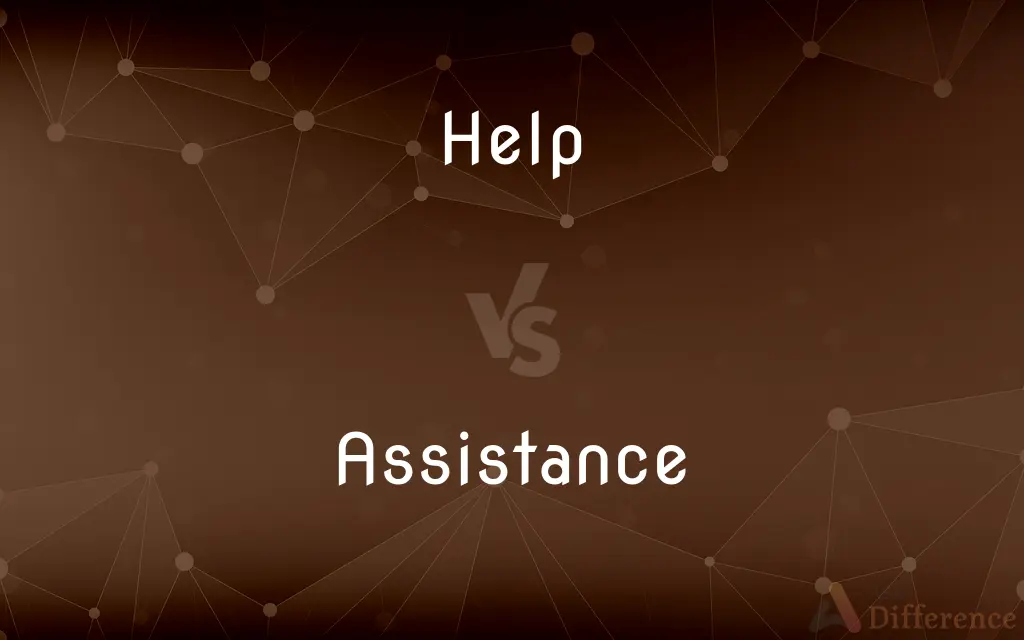Help vs. Assistance — What's the Difference?
By Tayyaba Rehman & Urooj Arif — Updated on March 7, 2024
Help and assistance both refer to providing support, but "help" implies more immediate, hands-on aid, while "assistance" suggests a more formal or structured support.

Difference Between Help and Assistance
Table of Contents
ADVERTISEMENT
Key Differences
Help is a broad term that encompasses a wide range of support, from casual, everyday acts to more significant interventions. It implies an action taken to make things easier for someone or to aid them in overcoming a difficulty. For example, helping someone lift a heavy object or helping a friend through a tough emotional time. Assistance, on the other hand, often carries a connotation of structured or professional support, such as financial assistance or medical assistance. It suggests a more formal or systematic aid, possibly involving organizations, professionals, or specific resources.
When someone offers help, it is typically understood as a more immediate and direct form of support, which might not always require specialized skills or resources. It's often personal and can be as simple as offering advice, physical labor, or moral support. Assistance, however, may imply a level of expertise or access to resources that go beyond personal effort, such as technical assistance from a professional or logistical assistance in organizing an event.
The context in which these terms are used can also highlight their differences. In everyday language, "help" is more commonly used for informal and spontaneous support, whereas "assistance" is often used in formal contexts, policies, and services where there is a framework or system to provide that support.
While help can be both requested and offered spontaneously, assistance often involves a request or application process, especially in formal settings. For example, one might apply for financial assistance or request technical assistance, indicating a more structured approach to receiving support.
Despite these nuances, in many contexts, help and assistance can be used interchangeably without significant changes in meaning. The choice between them often comes down to the formality of the situation, the nature of the support provided, and personal preference in language use.
ADVERTISEMENT
Comparison Chart
Connotation
Immediate, hands-on support
Formal or structured support
Context
Casual, everyday situations
Formal settings, professional services
Nature
Personal, can be spontaneous
Often involves expertise or resources
Examples
Lifting heavy objects, emotional support
Financial aid, technical support
Requesting
Can be offered or requested spontaneously
Often involves a formal request or application
Compare with Definitions
Help
Providing immediate aid or support.
She offered to help him with his homework.
Assistance
Often involves professional services or resources.
The embassy offers consular assistance to citizens abroad.
Help
Personal and direct.
He helped her through a tough time with heartfelt advice.
Assistance
Providing structured or formal support.
The program provides financial assistance to students.
Help
Often involves physical or emotional support.
Offering a listening ear can be a big help to someone in distress.
Assistance
Can be specific and specialized.
Technical assistance was provided to set up the new computer system.
Help
Can be informal or spontaneous.
Seeing the spill, he immediately helped clean up.
Assistance
May require an application or request.
They applied for government assistance during the crisis.
Help
Does not necessarily require expertise.
Anyone can help by volunteering their time.
Assistance
Implies a systematic approach to support.
The organization offers logistical assistance for disaster relief efforts.
Help
Make it easier or possible for (someone) to do something by offering them one's services or resources
The teenager helped out in the corner shop
She helped him find a buyer
They helped her with domestic chores
Assistance
The act of assisting.
Help
Serve someone with (food or drink)
May I help you to some more meat?
She helped herself to a biscuit
Assistance
Aid; help
Financial assistance.
Help
Cannot or could not avoid
He couldn't help laughing
I'm sorry to put you to any inconvenience, but it can't be helped
Assistance
Aid; help; the act or result of assisting.
Help
The action of helping someone to do something
I asked for help from my neighbours
Assistance
The act of assisting; help; aid; furtherance; succor; support.
Without the assistance of a mortal hand.
Help
Used as an appeal for urgent assistance
Help! I'm drowning!
Assistance
An assistant or helper; a body of helpers.
Wat Tyler [was] killed by valiant Walworth, the lord mayor of London, and his assistance, . . . John Cavendish.
Help
To give assistance to (someone); make it easier for (someone) to do something; aid
She helped me with my project. I helped her find her book.
Assistance
Persons present.
Help
To give material or financial aid to
Help the homeless.
Assistance
The activity of contributing to the fulfillment of a need or furtherance of an effort or purpose;
He gave me an assist with the housework
Could not walk without assistance
Rescue party went to their aid
Offered his help in unloading
Help
To wait on, as in a store or restaurant
Please help the customer in aisle 20.
Assistance
A resource;
Visual aids in teaching
Economic assistance to depressed areas
Help
To contribute to the effectiveness or improvement of (something); improve or advance
Tax breaks to help create jobs.
New ways to help the environment.
A remark that didn't help the situation.
Help
To ease the pain or discomfort of; relieve
Medication to help your cold.
Help
To refrain from; avoid or resist. Used with can or cannot
Couldn't help laughing.
Help
To be of service; give assistance
I made a cake, and my friend helped.
Help
To be of use or provide relief
He has a bad back, and physical therapy hasn't helped.
Help
The action of helping; assistance
Do you need help with that package?.
Help
One that helps
You've been a great help. A food processor is a help to the serious cook.
Help
(Archaic) A person employed to help, especially a farm worker or domestic servant.
Help
Such employees considered as a group. Often used with the.
Help
(uncountable) Action given to provide assistance; aid.
I need some help with my homework.
Help
Something or someone which provides assistance with a task.
He was a great help to me when I was moving house.
I've printed out a list of math helps.
Help
Documentation provided with computer software, etc. and accessed using the computer.
I can't find anything in the help about rotating an image.
Help
One or more people employed to help in the maintenance of a house or the operation of a farm or enterprise.
The help is coming round this morning to clean.
Most of the hired help is seasonal, for the harvest.
Help
(uncountable) Correction of deficits, as by psychological counseling or medication or social support or remedial training.
His suicide attempts were a cry for help.
He really needs help in handling customer complaints.
“He’s a real road-rager.” / “Yup, he really needs help, maybe anger management.”
Help
(transitive) To provide assistance to (someone or something).
He helped his grandfather cook breakfast.
Help
(transitive) To assist (a person) in getting something, especially food or drink at table; used with to.
It is polite to help your guests to food before serving yourself.
Help yourself to whatever's in the fridge.
Help
(transitive) To contribute in some way to.
The white paint on the walls helps make the room look brighter.
If you want to get a job, it helps to have some prior experience.
Help
(intransitive) To provide assistance.
She was struggling with the groceries, so I offered to help.
Please, help!
Help
(transitive) To avoid; to prevent; to refrain from; to restrain (oneself). Usually used in nonassertive contexts with can.
We couldn’t help noticing that you were late.
We couldn’t help but notice that you were late.
She’s trying not to smile, but she can’t help herself.
Can I help it if I'm so beautiful?
Can I help it that I fell in love with you?
Are they going to beat us?
Not if I can help it!
She never does more than she can help.
Help
A cry of distress or an urgent request for assistance
Help
To furnish with strength or means for the successful performance of any action or the attainment of any object; to aid; to assist; as, to help a man in his work; to help one to remember; - the following infinitive is commonly used without to; as, "Help me scale yon balcony."
Help
To furnish with the means of deliverance from trouble; as, to help one in distress; to help one out of prison.
Help
To furnish with relief, as in pain or disease; to be of avail against; - sometimes with of before a word designating the pain or disease, and sometimes having such a word for the direct object.
The true calamus helps coughs.
Help
To change for the better; to remedy.
Cease to lament for what thou canst not help.
Help
To prevent; to hinder; as, the evil approaches, and who can help it?
Help
To forbear; to avoid.
I can not help remarking the resemblance betwixt him and our author.
Help
To wait upon, as the guests at table, by carving and passing food.
The god of learning and of lightWould want a god himself to help him out.
Help
To lend aid or assistance; to contribute strength or means; to avail or be of use; to assist.
A generous present helps to persuade, as well as an agreeable person.
Help
Strength or means furnished toward promoting an object, or deliverance from difficulty or distress; aid; ^; also, the person or thing furnishing the aid; as, he gave me a help of fifty dollars.
Give us help from trouble, for vain is the help of man.
God is . . . a very present help in trouble.
Virtue is a friend and a help to nature.
Help
Remedy; relief; as, there is no help for it.
Help
A helper; one hired to help another; also, thew hole force of hired helpers in any business.
Help
Specifically, a domestic servant, man or woman.
Help
The activity of contributing to the fulfillment of a need or furtherance of an effort or purpose;
He gave me an assist with the housework
Could not walk without assistance
Rescue party went to their aid
Offered his help in unloading
Help
A resource;
Visual aids in teaching
Economic assistance to depressed areas
Help
A means of serving;
Of no avail
There's no help for it
Help
A person who contributes to the fulfillment of a need or furtherance of an effort or purpose;
My invaluable assistant
They hired additional help to finish the work
Help
Give help or assistance; be of service;
Everyone helped out during the earthquake
Can you help me carry this table?
She never helps around the house
Help
Be of use;
This will help to prevent accidents
Help
Improve the condition of;
These pills will help the patient
Help
Abstain from doing; always used with a negative;
I can't help myself--I have to smoke
She could not help watching the sad spectacle
Help
Contribute to the furtherance of;
This money will help the development of literacy in developing countries
Help
Improve; change for the better;
New slipcovers will help the old living room furniture
Help
Help to some food; help with food or drink;
I served him three times, and after that he helped himself
Help
Take or use;
She helped herself to some of the office supplies
Common Curiosities
What is the difference between help and assistance?
Help implies more immediate, hands-on support, often informal and spontaneous, while assistance suggests formal or structured support, possibly involving expertise or resources.
How do you request assistance?
Requesting assistance typically involves a formal process, such as filling out an application, making a formal request, or contacting a professional or organization that provides the specific type of support needed.
Can help be offered in professional contexts?
Yes, help can be offered in professional contexts, but it may be more casual or direct, such as a colleague helping with a task.
Can offering help require expertise?
Offering help can require expertise, especially in contexts where specialized knowledge or skills are needed to effectively provide support, though it often involves more general forms of aid.
How does language use affect the perception of help vs. assistance?
The choice of language, such as using "help" in casual settings or "assistance" in formal contexts, can affect the perception of the support provided, with "help" often seen as more personal and "assistance" as more professional or structured.
Is assistance always formal?
Assistance often implies a more formal or structured form of support, especially when it involves organizations, professionals, or specific resources, but informal assistance can also occur in certain contexts.
Can assistance be informal?
While assistance often suggests a more formal or structured form of support, it can be informal in certain contexts, especially when it involves less formal networks of support, such as community or family assistance.
What are examples of assistance?
Examples of assistance include financial aid, technical support, medical assistance, and legal aid, often provided by organizations or professionals in those fields.
Is emotional support considered help or assistance?
Emotional support is typically considered help, as it involves personal, direct support and does not usually require formal structures or expertise.
How does the immediacy of help differ from assistance?
Help often implies immediate support in response to a need or problem, whereas assistance may involve a process, including evaluation and allocation of resources or expertise, making it less immediate.
Share Your Discovery

Previous Comparison
Envy vs. Hate
Next Comparison
Flee vs. FleaAuthor Spotlight
Written by
Tayyaba RehmanTayyaba Rehman is a distinguished writer, currently serving as a primary contributor to askdifference.com. As a researcher in semantics and etymology, Tayyaba's passion for the complexity of languages and their distinctions has found a perfect home on the platform. Tayyaba delves into the intricacies of language, distinguishing between commonly confused words and phrases, thereby providing clarity for readers worldwide.
Co-written by
Urooj ArifUrooj is a skilled content writer at Ask Difference, known for her exceptional ability to simplify complex topics into engaging and informative content. With a passion for research and a flair for clear, concise writing, she consistently delivers articles that resonate with our diverse audience.














































